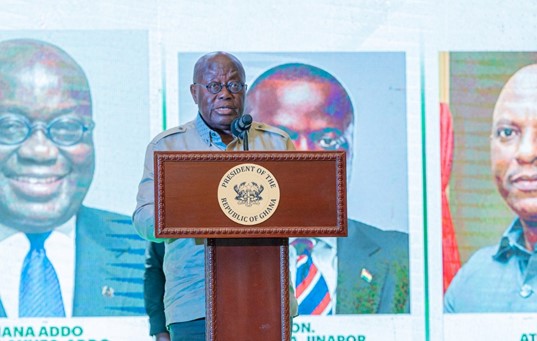The Ghana Integrated Aluminium Development Corporation (GIADEC) has been strategically established by government to add value to the country’s raw bauxite resources and phase-out raw exports of the natural resource in the short- to medium-term, President Nana Addo Dankwa Akufo-Addo has said.
According to the president, the real value of natural resources lies in their value-added; noting that the global aluminium industry’s value – for example from bauxite mining through alumina smelting and alumina production – is estimated to be over US$180billion annually.
“But raw bauxite accounts for only 7.6 percent of this market, while the remaining 92.3 percent is generated from processed bauxite. This case is not different from those of gold, iron ore, manganese, cobalt or lithium. Indeed, currently, African countries involved in the production of lithium are set to be taking just about 10 percent from the entire value chain of the electric battery industry.”
It is against this background that he said: “This is why government has prioritised local content and local participation, as well as value addition in the natural resources sector, to ensure that we derive optimal benefits from these God-given resources.
“Through GIADEC, established in 2018, we are working to ensure value-addition in our bauxite resources through refining, smelting, aluminium production, as well as the production of other downstream aluminium products.
“Implementation of the 4-project agenda [of GIADEC] is expected to optimise production in the upstream industry and spur production and job creation in the downstream sector,” Akufo-Addo further remarked.
President Akufo-Addo said this during a two-day Natural Resource Stakeholders’ Dialogue, in Accra. It was held under the theme ‘Harnessing our Natural Resources Responsibly for our Sustainable Collective Good’.
The dialogue is among others aimed at generating stakeholder discussions on policy suggestions which can be implemented to arrest the phenomenon of illegal mining and logging.
The president noted that Ghana, over the years, “has not always done well in negotiations with the countries that exploit its natural resources”.
“The country has until recently, failed to put in place the requisite framework that will enable us to ensure the highest gains from the extractive industry’s value chains.
“Extensive tax and royalties’ exemptions, intolerable labour practices and lack of value addition in the country have resulted in exceptional profits to mining companies at the expense of our communities, towns, cities and country. We cannot repeat those mistakes.
“While it is fully understood that mining companies must make profit from their businesses, it is important that this is not done at the expense of the lands and peoples that provide these resources,” President Akufo-Addo said.
“For several years, the extractive sector has been the largest tax base of our country, apart from providing thousands of employment opportunities to young men and women. The truth, however, is that over the years we have not benefitted optimally from these resources due to our overdependence on the export of raw products,” he added.
Speaking on the potential of GIADEC, President Akufo-Addo indicated: “With an estimated bauxite resource base of over 900 million metric tonnes, this sector can serve as an anchor for the country’s industrialisation if we continue to pursue value-added policies.
“By section 28 of the GIADEC law and section 30 of the GISDEC law, the Minister for Lands and Natural Resources is empowered to make regulations that ensure no bauxite or iron ore in their raw state is exported out of the country five years after these laws coming into force.
“With the policies and measures we are putting in place, we intend to invoke these provisions of our law; and soon, bauxite and iron ore will no longer be exported in their raw state from the country,” Akufo-Addo said.
GIADEC commenced operations in 2019, and the corporation is working to ensure value addition across the full value chain of aluminium production. It is driving the development of mining, refining to produce alumina, and smelting to produce primary aluminium; and ultimately, to develop a downstream aluminium industry in Ghana.










